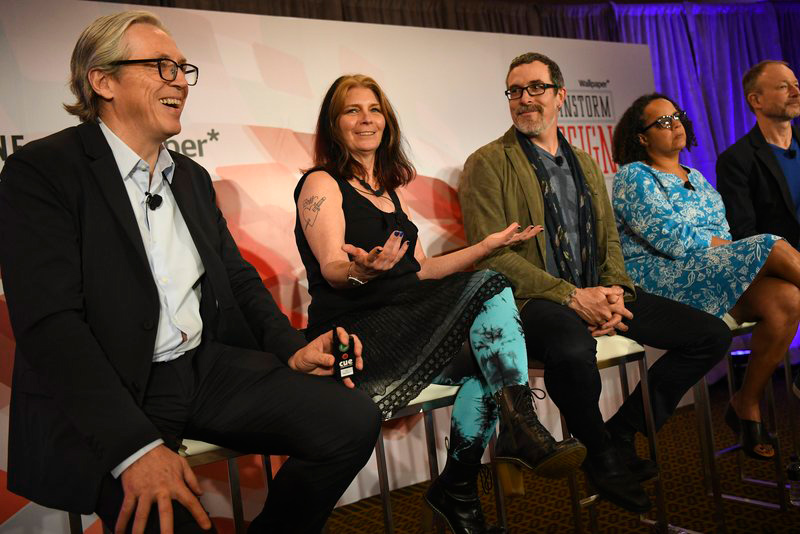大公司需要更好的設(shè)計(jì)業(yè)務(wù)領(lǐng)導(dǎo),原因何在,?

|
在過去5年中,共有50多個(gè)頂級(jí)設(shè)計(jì)和創(chuàng)新公司被其他公司收購。但該領(lǐng)域的多位領(lǐng)袖稱,,各大公司通常在新項(xiàng)目收購之時(shí)感到十分糾結(jié),,而且難以有效領(lǐng)導(dǎo)其設(shè)計(jì)團(tuán)隊(duì)。
他們在不久前新加坡《財(cái)富》頭腦風(fēng)暴設(shè)計(jì)大會(huì)的圓桌會(huì)議上討論了設(shè)計(jì)業(yè)務(wù)的領(lǐng)導(dǎo)力問題,。
瑪利亞·茱蒂絲說:“有關(guān)如何成為好領(lǐng)導(dǎo)的培訓(xùn)并不多,,但有關(guān)如何成為好經(jīng)理的培訓(xùn)卻有一大堆?!痹诂斃麃喌膸椭?,體驗(yàn)設(shè)計(jì)公司Hot Studio從兩個(gè)人發(fā)展為一家全服務(wù)機(jī)構(gòu),后被Facebook收購,。
她還指出:“領(lǐng)導(dǎo)者通常從經(jīng)理中產(chǎn)生,,但這些經(jīng)理并不一定真的了解這兩個(gè)角色之間的細(xì)微差別和區(qū)別?!彼J(rèn)為成功的設(shè)計(jì)職業(yè)并不僅僅是為了滿足關(guān)鍵指標(biāo),。
Invisible Design負(fù)責(zé)人哈里·韋斯特認(rèn)為,大型機(jī)構(gòu)通常缺乏設(shè)計(jì)業(yè)務(wù)領(lǐng)導(dǎo)者,,可能也反映了人們普遍缺乏對設(shè)計(jì)內(nèi)容的理解,。
他說:“設(shè)計(jì)是一個(gè)非常寬泛的詞。人們對它的理解往往過于簡化,,而且大型機(jī)構(gòu)會(huì)說,,‘我們需要一些設(shè)計(jì)業(yè)務(wù):你去做吧?!?/p>
Salesforce產(chǎn)品設(shè)計(jì)與用戶體驗(yàn)執(zhí)行副總裁賈斯丁·馬奎表示,,設(shè)計(jì)業(yè)務(wù)領(lǐng)導(dǎo)者應(yīng)多花一點(diǎn)時(shí)間了解他們希望執(zhí)掌的機(jī)構(gòu),甚至可能包括采用一些重要的設(shè)計(jì)方法,。
他說:“在我心目中,,這類領(lǐng)導(dǎo)首先應(yīng)該在公司內(nèi)部啟用一個(gè)人種學(xué)流程?!蓖瑫r(shí)他還承認(rèn),,很多公司可能并不會(huì)聘用那些希望在正式開展業(yè)務(wù)之前執(zhí)行6個(gè)月研究流程的領(lǐng)導(dǎo)者。
但馬奎的同事,、用戶洞見與分析業(yè)務(wù)副總裁納里尼·科塔拉珠并不認(rèn)為領(lǐng)導(dǎo)設(shè)計(jì)創(chuàng)意業(yè)務(wù)與領(lǐng)導(dǎo)其他職業(yè)有什么太大的區(qū)別,。
她對觀眾說:“我一開始就懷疑‘什么讓設(shè)計(jì)師認(rèn)為自己是如此特別’?”,。她的這一論斷迎來了一陣掌聲,。
哈里·韋斯特認(rèn)為,這種區(qū)別很小,,因?yàn)樵O(shè)計(jì)師更注重職業(yè)滿足感,,而不是金錢,。
科塔拉珠并不贊同這一說法,她說:“數(shù)據(jù)科學(xué)家,、工程師和統(tǒng)計(jì)學(xué)家亦是如此,,我們都在尋找工作的意義?!?/p>
很多公司從其他領(lǐng)域引進(jìn)人才,,或試圖花錢收購相關(guān)機(jī)構(gòu)來解決設(shè)計(jì)業(yè)務(wù)困境。多名小組成員援引了業(yè)務(wù)整合奏效的案例,。但馬奎表示,,在這一過程中保持謹(jǐn)慎的態(tài)度十分重要,。
它說:“在Facebook行得通的設(shè)計(jì)和創(chuàng)新文化對于微軟來說可能就行不通,。”
韋斯特說,,不用擔(dān)心,,各大在收購機(jī)構(gòu)和管理其設(shè)計(jì)部門方面正逐漸變得更加得心應(yīng)手。
他說:“最終,,人們將變得更加明智,,而且會(huì)更加理智地對待收購的對象?!保ㄘ?cái)富中文網(wǎng)) 譯者:馮豐 審校:夏林 |
In the last five years, there have been more than 50 acquisitions of top design and innovation firms. But several leaders in the field say companies often struggle with new acquisitions and fail to provide their design teams with leadership.
They made the comments at a roundtable discussion about design leadership last Wednesday at the Fortune Brainstorm Design conference in Singapore.
“There’s not a lot of training to be a good leader. There’s tons of training about how to be a great manager,” said Maria Giudice, who built experience design firm Hot Studio from a two-person company to a full-service agency before it was acquired by Facebook.
“Oftentimes there’s a manager who gets elevated to become a leader, but they don’t really understand the nuances and the differences between [the roles],” she added, suggesting that a successful design career was about more than meeting key metrics.
Harry West, principal at Invisible Design, agreed that design leadership is often lacking in large organizations, perhaps reflecting a broader lack of understanding about what design entails.
“Design’s a very big word,” he said. “Too often it just gets overly simplified and a large organization says, ‘We need some of that D stuff: You’ll do.'”
Justin Maguire, EVP of Product Design and User Experience at Salesforce, said design leaders should spend a little more time finding out about the organizations they hope to lead, perhaps even applying some key design methodologies.
“I’d be looking for someone whose first step is to almost run an ethnographic process internally,” he said, while acknowledging that many companies might balk at a leader who wants to conduct a six month research process before getting down to business.
But Maguire’s colleague Nalini Kotamraju, VP for User Insights and Analytics, wasn’t so convinced that leading design creatives is significantly different than leading other professionals.
“I have the natural skepticism of, ‘What makes designers think they’re so special’?” she told the audience to some applause.
Harry West suggested that designers were a little different because they placed a greater emphasis on professional satisfaction than on money.
Kotamraju disagreed. “So do data scientists, so do engineers, so do statisticians,” she said. “We are all looking for meaning in our work.”
Many companies bring in talent from elsewhere or try to buy their way out of design dilemmas by acquiring an agency. Several panelists cited examples of where integrations had worked well. But Maguire said it’s important to tread carefully.
“What works for the culture of design and innovation at Facebook is probably horrific at Microsoft,” he said.
Not to worry. Companies are becoming savvier about buying agencies and managing their design departments, West said.
“Eventually,” he said, “people will wise up and become smarter about what they’re buying.” |













